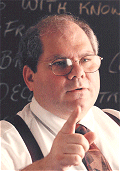
|
QW2001 Workshop W1 Dr. Cem Kaner Developing The Right Test Documentation |
|
The best approach to test documentation depends on the project context. For example, a paper-intensive test documentation strategy like IEEE 829 is useful for some projects but can get in the way of development of a high-volume automated testing strategy. In the course of writing the third edition of Testing Computer Software, we are looking at test planning/documentation from a different viewpoint. It seems to us that: * The set of documentation is a deliverable, that can be significantly expensive and that can have a significant impact on the project or the company. * To decide what documentation is appropriate, we should do a requirements analysis, askingWe also consider the content of the test plan. We think that we have some guidance to offer in terms of evaluating the coverage of the test documentation (how well different aspects of the product are covered and how well different risks are covered).
- who are the favored, disfavored, and ignored users/recipients of this documentation and why
- what they need or want, and why
- what it costs to fully or partially satisfy these requirements
The associated paper will present some specific test documentation techniques that we use (various types of charts), that we have taught before.
This presentation pulls together work from other talks and from the Los Altos Workshops on Software Testing. There is a lot of material. It can easily fill a day's tutorial and it can be scaled back to a shorter session (45-90 minutes) that is supported by a long paper.
Cem Kaner is Professor of Computer Sciences at the Florida Institute of Technology.Prior to joining Florida Tech, Kaner worked in Silicon Valley for 17 years, doing and managing programming, user interface design, testing, and user documentation. He is the senior author (with Jack Falk and Hung Quoc Nguyen) of TESTING COMPUTER SOFTWARE (2nd Edition) and (with David Pels) of BAD SOFTWARE: WHAT TO DO WHEN SOFTWARE FAILS.
Through his consulting firm, KANER.COM, he teaches courses on black box software testing and consults to software publishers on software testing, documentation, and development management.
Kaner is also the co-founder and co-host of the Los Altos Workshop on Software Testing, the Software Test Managers' RoundTable, the Workshop on Heuristic & Exploratory Techniques, and the Florida Workshops on Model-Based Testing.
Kaner is also attorney whose practice is focused on the law of software quality. He is active (as an advocate for customers, authors, and small development shops) in several legislative drafting efforts involving software licensing, software quality regulation, and electronic commerce.
Kaner holds a B.A. in Arts & Sciences (Math, Philosophy), a Ph.D. in Experimental Psychology (Human Perception & Performance: Psychophysics), and a J.D. (law degree). He is Certified in Quality Engineering by the American Society for Quality.